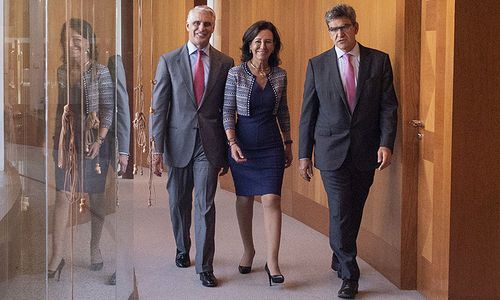In a stunning reversal, incoming Santander CEO Andrea Orcel lost his job before even starting. The Spanish lender said it can't afford the former UBS investment bank chief.
Andrea Orcel was to have taken the CEO seat at Madrid-based Santander sometime this quarter. The veteran European rainmaker was hired for the job nearly four months ago, by the Botin family which has run Santander for more than 100 years, as finews.com reported.
On Tuesday, Santander said it didn't want the 55-year-old after all – because he is too expensive. The bank also signalled that it had disagreed with UBS over the terms of his departure.
«It has now become clear that the cost to Santander of compensating Mr. Orcel for the deferred awards he has earned over the past seven years, and other benefits previously awarded to him, would be a sum significantly above the board’s original expectations at the time of the appointment,» Santander said in a statement.
Big Payday
UBS deflected blame for the squabble, saying it had applied the compensation plan rules that apply in such cases and made them transparent to all parties before decisions were taken. «This is a matter between Andrea Orcel and Santander.»
The retreat is a stunning upset for Orcel, who while at UBS had made no secret of his ambition to become a CEO eventually. His pay there reflected his high-flying status: in 2014, Orcel was the top earner at UBS, surpassing even CEO Sergio Ermotti, who had recruited him away from Merrill Lynch.
Specifically, Orcel won a 25 million Swiss franc ($25.5 million) pay package from the Swiss bank. The outsized payday – made up of deferred cash and shares, which vested over three years – is in keeping with investment banking practices to cushion the financial blow of defecting.
City Practice
It was designed to replace pay relinquished after Orcel jumped to UBS from Bank of America Merrill Lynch. If such paydays are de rigueur in the City, they are out of the question at Santander.
Though the Spanish bank posted 6.62 billion euros ($7.59 billion) in net profit last year, its apparent unwillingness to grit its teeth, pay up, and risk a scathing indictment by shareholders reflects the different nature of its business.
Austerity vs Millions
The Spanish bank is largely a commercial and retail lender, not a wealth manager or investment bank of note. It is also based in a country where austerity measures are still keenly felt and unemployment has levelled at roughly 15 percent.
In short, the sum needed to buy Orcel out of his UBS instruments – reportedly upward of 50 million euros – would likely have created a public maelstrom. «The board considers that for Santander to pay this amount to facilitate the hiring of one individual, even one of the calibre and background of Mr. Orcel, would be unacceptable for a retail and commercial bank such as Santander,» it said.
Amateurish, Insensitive
Santander comes off as amateurish through the episode: the amount of outstanding shares that Orcel owns in UBS – both vested and unvested – is disclosed publicly every year.
The episode also reflects badly on Orcel, a long-time adviser to Chairman Botin as well as her father who preceded her in the job, for a lack of sensitivity of very different norms between UBS and Santander.
UBS Vacuum
His next move is unclear. The Santander squabble will have cooled Orcel's excellent relationship with UBS CEO Ermotti. Though UBS has a glaring succession problem, as finews.com reported last week, a potential return by Orcel is unlikely at best. A spokesman for UBS declined to comment.
The Swiss bank has already replaced Orcel with Piero Novelli, a fellow European dealmaking heavyweight, and Robert Karofsky, who ran UBS' equities arm.




































